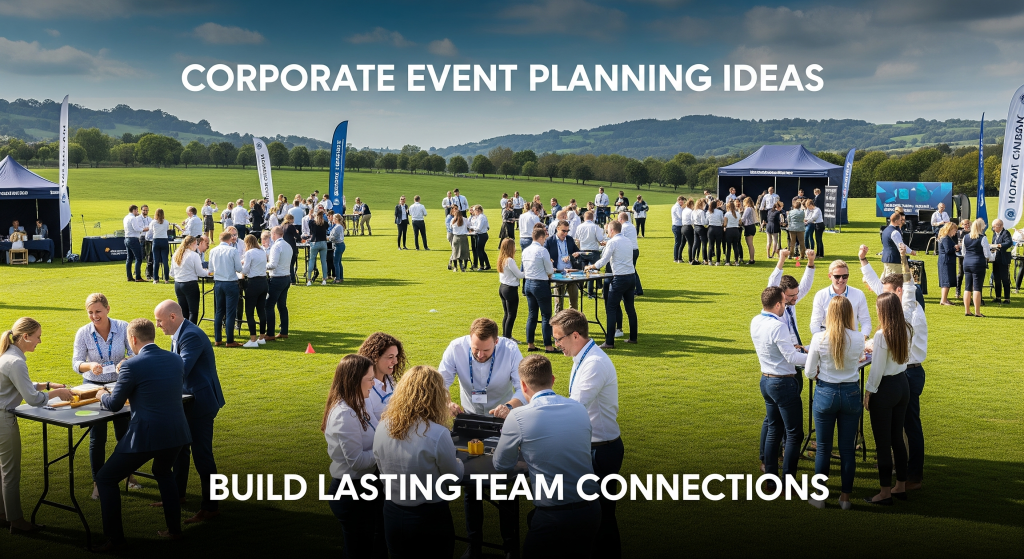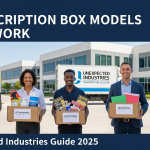Corporate event planning can make or break your team’s morale and productivity. The right event creates lasting bonds, while poor planning wastes money and leaves employees feeling disconnected. After five years of organizing corporate events for companies ranging from tech startups to Fortune 500 firms, I’ve learned what truly works.
My name is Richard Boren, and I’ve planned over 200 corporate events during my career. I started as an HR coordinator at a mid-sized marketing firm, where I quickly discovered that traditional office parties weren’t cutting it. Employees would show up, eat some cake, and leave early. Something had to change.
Through trial and error, I developed strategies that transformed how teams connect. I’ve seen shy accountants become confident presenters after team-building retreats. I’ve watched cross-departmental rivalries dissolve during well-planned collaborative events. These experiences taught me that great corporate events don’t just happen—they require careful planning, genuine understanding of team dynamics, and a focus on authentic connection.
Understanding Modern Corporate Event Needs
Corporate events serve multiple purposes beyond simple entertainment. They boost employee engagement, improve communication between departments, and create shared experiences that strengthen company culture. Research shows that engaged employees are 23% more profitable and 18% more productive than their disengaged counterparts.
The landscape has shifted dramatically since 2020. Remote work, hybrid schedules, and changing employee expectations require fresh approaches to corporate gatherings. Traditional holiday parties and annual picnics no longer meet the complex needs of modern workforces.
Successful events now focus on building genuine connections rather than forced fun. They create opportunities for authentic interaction while respecting diverse personality types and working styles. The best events feel natural and engaging, not like mandatory attendance at another corporate obligation.
Key Elements of Effective Corporate Events
Modern corporate events succeed when they incorporate specific elements that address real workplace challenges. These events must be inclusive, accessible, and genuinely valuable to participants.
Purposeful Design: Every event should have clear objectives beyond “having fun.” Whether building cross-departmental relationships, celebrating achievements, or developing skills, the purpose guides every planning decision.
Diverse Activity Options: Successful events offer multiple ways to participate. Some people thrive in large group activities, while others prefer smaller, intimate conversations. The best events accommodate both preferences.
Professional Growth Opportunities: Employees value events that contribute to their development. This might include learning new skills, networking with industry professionals, or gaining insights into different departments.
Authentic Interaction: Forced icebreakers and awkward team-building exercises often backfire. Instead, create natural opportunities for meaningful conversations and shared experiences.
Team Building Events That Actually Work
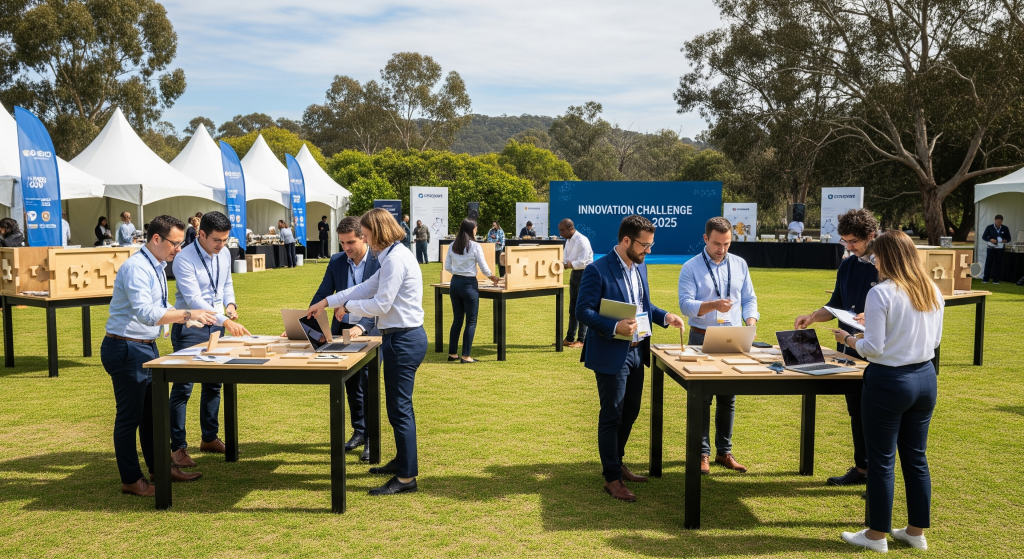
Traditional trust falls and rope courses have their place, but modern teams need more sophisticated approaches to building connections. The most effective team-building events address real workplace challenges while creating enjoyable experiences.
Problem-Solving Challenges
Escape rooms have become popular for good reason—they require communication, collaboration, and creative thinking. However, the best team-building events go beyond entertainment to develop actual workplace skills.
I once organized a “Project Rescue” event where teams received broken projects from other departments and had to fix them within tight deadlines. Each team faced realistic challenges: unclear requirements, missing resources, and conflicting priorities. The exercise revealed communication gaps and problem-solving strengths that directly applied to daily work.
Benefits of Problem-Solving Events:
- Develop critical thinking skills
- Improve communication under pressure
- Reveal hidden talents and leadership potential
- Create shared accomplishment experiences
Skill-Sharing Workshops
Internal expertise often goes unrecognized in large organizations. Skill-sharing events tap into this knowledge while building connections between departments.
Create workshops where employees teach each other non-work skills. The finance manager might teach photography, while the developer shares cooking techniques. These sessions reveal personal sides of colleagues and create unexpected bonds.
| Event Type | Duration | Ideal Group Size | Primary Benefit |
|---|---|---|---|
| Escape Rooms | 1-2 hours | 4-8 people | Communication |
| Problem-Solving | 2-4 hours | 8-12 people | Collaboration |
| Skill Sharing | 1-3 hours | 6-15 people | Personal Connection |
| Volunteer Projects | 4-8 hours | 10-30 people | Shared Purpose |
Creative Workshop and Learning Events
Learning events serve dual purposes: developing valuable skills and creating shared growth experiences. These events work best when they balance professional development with team interaction.
Innovation Labs
Set up rotating stations where teams tackle real company challenges using design thinking principles. Each station focuses on different aspects: research, ideation, prototyping, and testing. Teams spend 30 minutes at each station before rotating.
This format keeps energy high while developing innovation skills. More importantly, it breaks down silos between departments as teams naturally mix and collaborate on solutions.
Digital Skills Bootcamps
Technology changes constantly, and many employees feel left behind. Digital skills bootcamps address this anxiety while building team connections through shared learning experiences.
I organized a “Digital Transformation Day” where employees learned social media marketing, basic coding, and data analysis. The marketing team taught content creation while IT explained automation tools. Cross-departmental teaching created new respect and understanding between groups.
Creative Expression Workshops
Art, music, and writing workshops tap into creativity that rarely emerges in typical work environments. These activities reveal different sides of colleagues and create relaxed atmospheres for natural conversation.
Successful Creative Workshop Formats:
- Collaborative mural painting projects
- Team storytelling and improv sessions
- Music creation using simple instruments
- Photography walks and sharing sessions
Outdoor Adventure and Sports Events
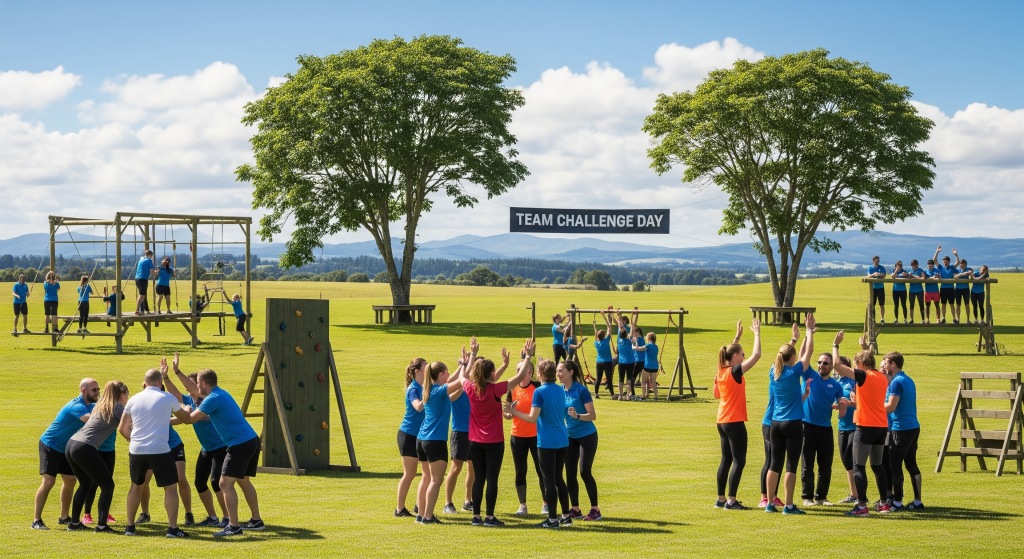
Outdoor events offer unique benefits: fresh air, physical activity, and removal from typical office environments. However, they require careful planning to ensure inclusivity and safety.
Adventure Team Challenges
Outdoor obstacle courses, hiking expeditions, and adventure races build trust and cooperation. The key is creating challenges that require teamwork rather than individual athletic ability.
Design courses where success depends on collaboration, not fitness levels. For example, create puzzles that require different people to complete different components, ensuring everyone contributes meaningfully.
Sports Tournament Days
Multi-sport tournaments work well because they accommodate different skill levels and interests. Set up stations for various activities: cornhole, table tennis, trivia, and board games alongside traditional sports.
Tournament Planning Considerations:
| Factor | Recommendation | Reason |
|---|---|---|
| Team Formation | Mixed departments | Breaks down silos |
| Activity Variety | 6-8 different options | Accommodates all interests |
| Skill Levels | Beginner-friendly rules | Ensures inclusion |
| Duration | 3-4 hours maximum | Prevents fatigue |
The key to successful sports events is emphasizing participation over competition. Award prizes for creativity, teamwork, and good sportsmanship rather than just winning.
Nature-Based Team Building
Outdoor environments naturally encourage different interactions than office settings. Hiking groups often develop deeper conversations than they would indoors. The shared challenge of navigating trails or completing outdoor tasks creates bonding experiences.
I’ve organized geocaching adventures where teams use GPS devices to find hidden caches throughout local parks. The activity combines problem-solving, communication, and exploration while getting teams outside their comfort zones.
Cultural and Celebration Events
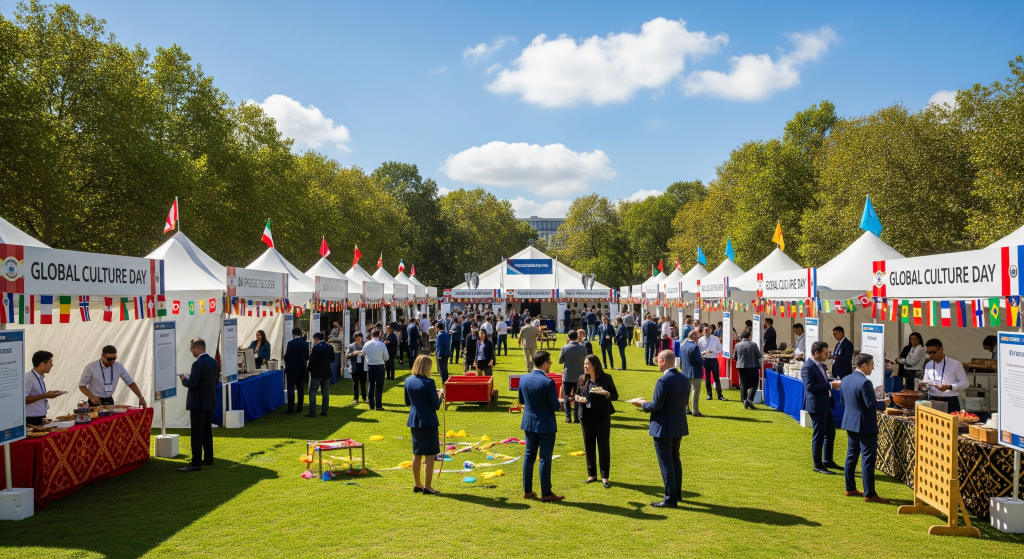
Cultural events celebrate diversity while educating teams about different backgrounds and perspectives. These events build understanding and create more inclusive workplaces when planned thoughtfully.
International Food and Culture Days
Food brings people together across cultural boundaries. International culture days allow employees to share their heritage while learning about colleagues’ backgrounds.
Structure these events as potluck celebrations where employees bring traditional dishes and share their significance. Create information stations where people can learn about different countries, traditions, and customs represented in your workforce.
Holiday Celebrations
Holiday events work best when they acknowledge diverse traditions rather than focusing on single celebrations. Create inclusive events that honor various cultural holidays throughout the year.
Inclusive Holiday Planning:
- Survey employees about important celebrations
- Rotate focus between different traditions
- Provide education about holiday significance
- Offer multiple ways to participate
Achievement Recognition Ceremonies
Recognition events celebrate individual and team accomplishments while reinforcing company values. The most effective recognition events feel genuine rather than corporate theater.
Create peer nomination systems where employees recognize each other’s contributions. This approach reveals achievements that management might miss while strengthening team relationships.
Virtual and Hybrid Event Solutions
Remote and hybrid teams require different approaches to event planning. Virtual events can build connections when designed with engagement and interaction in mind.
Virtual Team Building Activities
Online escape rooms, virtual cooking classes, and digital scavenger hunts can effectively engage remote teams. The key is choosing activities that work well through video conferencing technology.
I’ve had success with “Virtual Office Tours” where team members show their home workspaces and share personal items that represent their interests or background. These intimate glimpses into colleagues’ lives often create stronger connections than traditional office interactions.
Hybrid Event Formats
Hybrid events present unique challenges but also opportunities for creative solutions. The goal is ensuring both in-person and remote participants feel equally engaged and included.
Successful Hybrid Event Strategies:
| Challenge | Solution | Implementation |
|---|---|---|
| Audio Quality | Professional equipment | Invest in good microphones |
| Visual Engagement | Multiple cameras | Show different perspectives |
| Interaction Balance | Structured participation | Alternate between groups |
| Technical Support | Dedicated IT person | Have backup plans ready |
Digital Collaboration Projects
Create long-term projects that teams can work on together regardless of location. Digital newsletters, company podcasts, or collaborative video projects give teams shared goals while accommodating different schedules and time zones.
Entertainment and Social Events
Pure entertainment events serve important purposes in building team morale and providing stress relief. However, the most successful social events incorporate elements that encourage genuine interaction.
Game Nights and Tournaments
Board games, card tournaments, and video game competitions create relaxed environments for team bonding. The key is offering variety to accommodate different interests and comfort levels.
Set up multiple game stations with different complexity levels. Include classic games like Monopoly alongside modern strategy games and party games that encourage laughter and conversation.
Performance and Talent Shows
Employee talent shows reveal hidden abilities and create shared entertainment experiences. These events work best when participation is voluntary and the atmosphere remains supportive rather than competitive.
I’ve organized “Hidden Talents” events where employees share unexpected skills: magic tricks, musical performances, comedy routines, or artistic demonstrations. These events consistently surprise people and create lasting memories.
Comedy and Entertainment Nights
Professional entertainment can provide shared experiences that teams discuss long after the event ends. Comedy shows, murder mystery dinners, or interactive theater create common references and inside jokes.
Entertainment Event Considerations:
- Choose content appropriate for diverse audiences
- Ensure material aligns with company values
- Provide comfortable seating and good sightlines
- Include time for discussion and reaction sharing
Professional Development Events
Events that combine networking with skill development provide lasting value beyond team building. These events show investment in employee growth while creating learning communities within organizations.
Industry Expert Speakers
Bringing in external speakers exposes teams to new ideas while creating shared learning experiences. The most effective speaker events include discussion time where teams can process and apply new concepts together.
Choose speakers whose expertise relates to your team’s challenges or interests. Follow presentations with small group discussions or workshop sessions that encourage practical application of new concepts.
Networking Mixers
Internal networking events help employees understand different roles and departments. These events work particularly well in large organizations where people might not interact regularly.
Create structured networking activities rather than open mingling. Speed networking, department showcases, or project fair formats give people specific reasons to interact and learn about each other’s work.
Skills Development Workshops
Hands-on learning experiences create bonds between participants while developing valuable capabilities. The most successful workshops combine individual learning with collaborative application.
Effective Workshop Topics:
- Communication and presentation skills
- Project management techniques
- Leadership development exercises
- Technology and digital literacy
- Creative problem-solving methods
Budget-Friendly Event Ideas
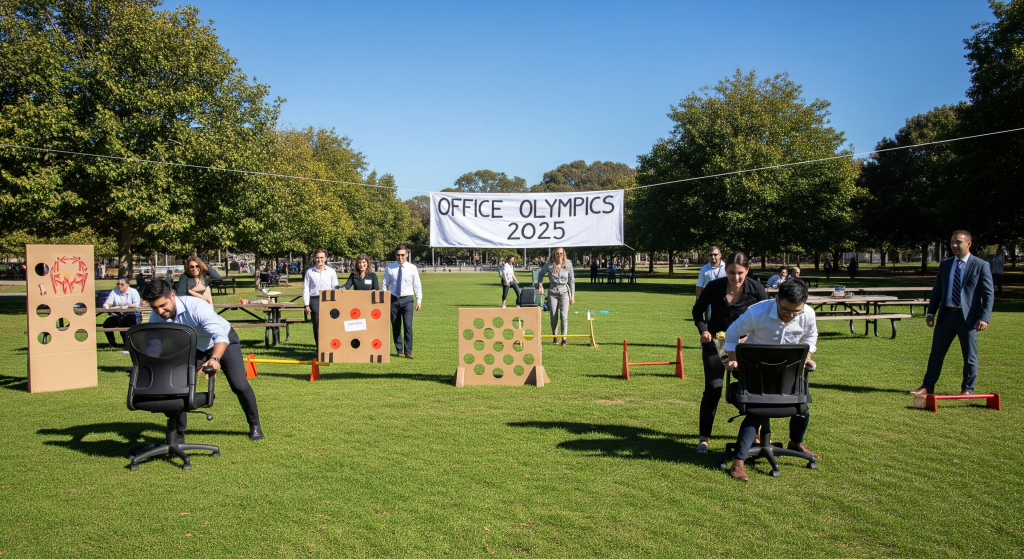
Effective corporate events don’t require large budgets. Some of the most memorable and successful events use creativity and planning rather than expensive venues or entertainment.
In-House Competitions
Create competitions using existing resources and employee talents. Department decoration contests, cooking competitions using office kitchen facilities, or skills challenges that showcase different roles can build excitement without significant costs.
I organized a “Office Olympics” using office supplies for various games: paper airplane contests, stapler relay races, and filing cabinet organization challenges. The absurd nature of the events created laughter and memorable moments without any budget requirements.
Potluck and Recipe Sharing Events
Food-centered events work well on limited budgets while encouraging cultural sharing. Create themed potlucks around different cuisines, comfort foods, or healthy eating initiatives.
Budget-Friendly Event Options:
| Event Type | Estimated Cost | Main Investment | Expected Outcome |
|---|---|---|---|
| Potluck Lunch | $50-100 | Decorations/plates | Cultural sharing |
| Office Olympics | $25-75 | Simple prizes | Team bonding |
| Walking Groups | $0-25 | Route planning | Health/conversation |
| Skill Swaps | $0 | Time coordination | Knowledge sharing |
Community Service Projects
Volunteer events build team connections while contributing to meaningful causes. Partner with local charities for food packing, environmental cleanup, or community building projects.
These events often cost less than entertainment-based alternatives while creating stronger team bonds through shared purpose and contribution.
Event Planning Best Practices
Successful corporate events require systematic planning and attention to detail. The difference between memorable events and forgettable ones often comes down to preparation and execution quality.
Understanding Your Team
Before planning any event, conduct informal surveys or focus groups to understand team preferences, concerns, and interests. Different generations, personality types, and cultural backgrounds have varying event preferences.
Some employees prefer active, energetic events while others value quiet, reflective activities. The best events offer options that accommodate these differences rather than forcing everyone into identical experiences.
Timing and Logistics
Event timing significantly impacts attendance and engagement. Consider work schedules, personal commitments, and energy levels when scheduling events.
Optimal Timing Guidelines:
- Avoid busy work periods and deadlines
- Consider commute and family obligations
- Allow adequate planning and communication time
- Build in buffer time for setup and cleanup
Communication and Promotion
Clear, enthusiastic communication builds excitement and ensures good attendance. Start promoting events well in advance with save-the-date notices, followed by detailed information and reminders.
Use multiple communication channels: email announcements, team meetings, and internal social platforms. Include clear information about expectations, dress codes, and what to bring or prepare.
Measuring Event Success
Evaluating event effectiveness helps improve future planning and demonstrates value to organizational leadership. However, success metrics go beyond simple attendance numbers.
Feedback Collection Methods
Gather feedback through multiple channels to get comprehensive insights. Anonymous surveys capture honest opinions, while informal conversations reveal emotional responses and unexpected outcomes.
Ask specific questions about different event aspects: organization quality, activity enjoyment, networking opportunities, and overall value. Include open-ended questions that allow detailed responses.
Long-Term Impact Assessment
The best corporate events create lasting changes in team dynamics, communication patterns, and workplace culture. Monitor these longer-term impacts through regular pulse surveys and observation.
Look for increases in cross-departmental collaboration, improved communication in meetings, and stronger relationships between previously disconnected team members.
Success Measurement Framework:
| Metric Type | Measurement Method | Timeline | Key Indicators |
|---|---|---|---|
| Immediate | Post-event surveys | 1-3 days | Satisfaction scores |
| Short-term | Team observations | 2-4 weeks | Changed interactions |
| Long-term | Culture assessments | 3-6 months | Engagement levels |
Frequently Asked Questions
How often should we organize corporate events? Plan major events quarterly with smaller monthly activities. This frequency maintains engagement without causing event fatigue or budget strain. Adjust based on team size, budget, and feedback.
What’s the ideal budget allocation for corporate events? Allocate 1-3% of annual payroll costs for employee events and team building activities. This investment typically provides strong returns through improved engagement and retention.
How do we ensure events work for introverted employees? Offer multiple participation levels and activity types. Include quiet spaces, optional activities, and smaller group options. Never force participation in high-energy or public-facing activities.
Should attendance be mandatory for corporate events? Make events voluntary whenever possible. Mandatory attendance often creates resentment and reduces genuine engagement. Focus on creating events people want to attend rather than requiring participation.
Conclusion
Corporate event planning succeeds when it focuses on authentic connection rather than forced fun. The most effective events address real workplace challenges while creating enjoyable, memorable experiences that strengthen team relationships.
After years of planning corporate events, I’ve learned that success comes from understanding your team, careful preparation, and genuine commitment to creating value for participants. The best events don’t just entertain—they transform how people work together and view their colleagues.
Start with small, manageable events that build trust and enthusiasm. As your planning skills develop and team engagement grows, you can tackle more ambitious projects that create lasting positive impacts on your organization’s culture and performance.
Remember that every team is different. What works for one organization might not work for another. Pay attention to feedback, remain flexible in your approach, and always focus on creating authentic opportunities for human connection in an increasingly digital workplace.

